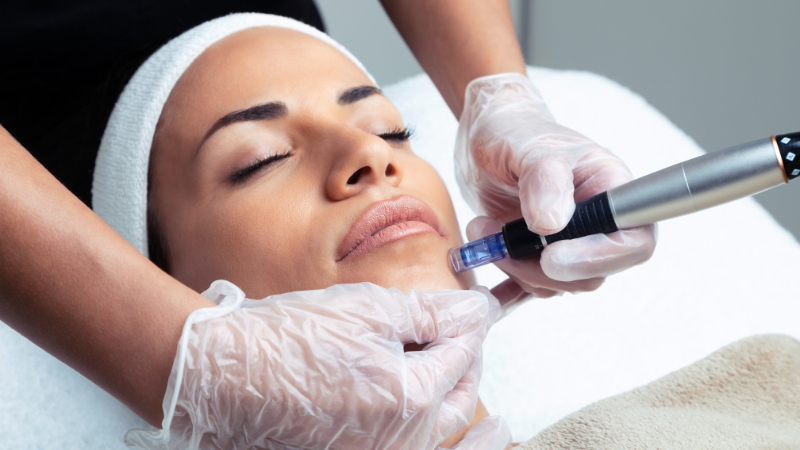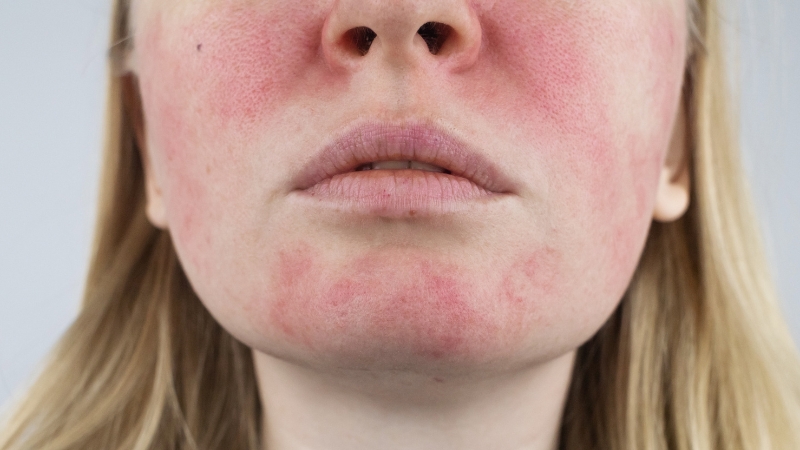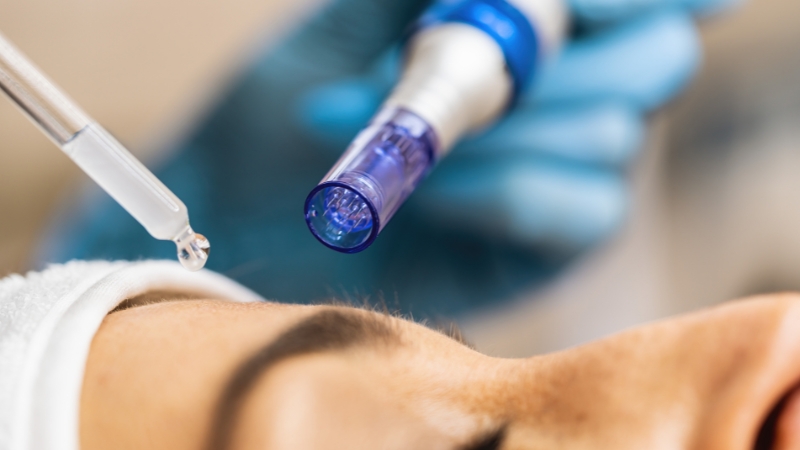
Share Post:
Microneedling, also known as collagen induction therapy, involves using fine needles to create tiny injuries in the skin to stimulate collagen and elastin production.
People seek it out to reduce fine lines, acne scars, enlarged pores, and hyperpigmentation. It’s a favorite among those looking for non-invasive yet highly effective rejuvenation options.
Knowing how and when results will appear helps manage expectations and maintain realistic goals. Results take time and proper care, but they often bring dramatic improvements with consistency.
If you’re considering microneedling and want expert guidance, CORE Wellness & Recovery offers professional support and personalized treatment plans.
Concerns such as fine lines, textural irregularities, scarring, and uneven pigmentation are often the main reasons people turn to microneedling.
Table of Contents
ToggleHow Microneedling Works
Microneedling uses controlled micro-injuries to trigger the skin’s natural healing mechanisms.
Fine needles puncture the skin at precise depths, prompting increased collagen and elastin production. These structural proteins play a vital role in skin firmness, elasticity, and overall appearance.
Popular devices include automated Dermapens and radiofrequency (RF) microneedling tools. RF rollers combine needle penetration with heat energy to boost collagen remodeling.
Enhancements such as platelet-rich plasma (PRP), specialized serums, or added radiofrequency treatments often increase the benefits.
The Results Timeline
Microneedling is not a treatment that reveals its full potential overnight.
Skin transformation happens in phases, with each stage offering specific changes and improvements.
Recognizing the timeline helps set proper expectations and encourages commitment to aftercare and follow-up sessions.
Immediate to 48 Hours Post-Treatment

The body begins to address the micro-injuries caused by the treatment with a surge in healing activity.
Common responses during this stage include:
- Redness resembling a sunburn
- Mild swelling and sensitivity
- Tightness or slight discomfort
- Possible pinpoint bleeding
- Visible glow starting around the 24–72-hour mark
Cellular turnover initiates in this phase.
While improvements are not fully visible yet, a fresher appearance begins to show, and many people notice a natural radiance starting to emerge.
Week 1 – Initial Healing Phase
Skin begins shedding old, damaged cells to make way for new growth.
The process often includes mild peeling or flaking, signaling the beginning of visible renewal.
Notable changes and care tips during this week:
- Skin may feel tight or dry as dead cells slough off
- Hydration levels in the skin improve
- Slight firmness begins to develop
- Avoid sun exposure and excessive sweating
- Stick to gentle cleansers and moisturizers
- Avoid makeup during the first few days
Skin appears slightly brighter and better hydrated.
Adhering to recommended aftercare is essential for maintaining progress and avoiding irritation or inflammation.
Weeks 2–4 – Collagen Production Begins
Microneedling is also known as Collagen Induction Therapy.
It’s a handheld device with tiny needles, that creates microscopic punctures in the skin, which stimulate the skin’s healing process. This process produces more collagen and elastin, which keeps skin firm and smooth. pic.twitter.com/MT8PwsTd8G— MedAndSpa (@MedandSpa) October 11, 2024
Structural changes begin taking place beneath the surface.
Collagen and elastin start forming as the body rebuilds and strengthens the treated skin.
Visible improvements during this period often include:
- More refined skin texture
- Brighter and more even skin tone
- Smaller, less visible pores
- Fine lines become less pronounced
- Smoother makeup application and softer feel
These changes tend to be gradual. Most people notice that their skin looks healthier and more balanced by the end of this phase.
Weeks 4–6 – Visible Rejuvenation
Collagen production accelerates and the results become more apparent.
Issues targeted by the treatment begin to diminish in a noticeable way.
Typical changes seen during weeks 4 to 6:
- Acne scars start fading
- Deeper wrinkles and folds soften
- Overall complexion looks clearer
- Enhanced firmness and elasticity
- Skin appears lifted and youthful
Compliments from others often begin during this window.
Skin quality makes a significant jump, reinforcing the benefits of continued sessions.
Months 2–6 – Peak Results

Sustained improvements define this stage, especially for those undergoing multiple sessions. Full collagen remodeling is underway, leading to the most dramatic outcomes.
Peak benefits typically include:
- Even, radiant skin tone
- Fewer visible signs of sun damage
- Significant softening of scars and lines
- Stronger, more resilient skin
- Lifted appearance in sagging areas
Multiple sessions, spaced properly, help ensure that improvements are both extensive and long-lasting.
How Long Will the Results Last?
For mild treatments, results typically last 3 to 5 months. With professional sessions and a consistent skincare routine, effects can extend up to 12 to 24 months.
Maintenance is key. Scheduling follow-up treatments two to three times a year helps maintain collagen levels and preserves skin improvements long term.
Factors Influencing Results Duration
Microneedling offers impressive outcomes, but several variables determine how long those improvements remain visible.
Not every individual will respond in the same way, and various internal and external elements can accelerate or prolong results.
Understanding these factors can help optimize your skincare investment and maintain healthier, more resilient skin for longer periods.
1. Skin’s Baseline Condition and Age
Skin that already has a strong collagen foundation tends to heal more quickly and show results for longer durations.
In contrast, more mature or severely damaged skin may require additional sessions to achieve and retain results.
Key considerations include:
- Natural collagen and elastin levels before treatment
- Degree of sun damage or scarring
- Skin tone irregularities and laxity
- Age-related slowdown in cell turnover
Younger individuals or those with fewer skin concerns generally notice more rapid improvements and retain them longer with minimal upkeep.
2. Depth and Frequency of Treatment
Shallow treatments target surface-level concerns like mild pigmentation and fine lines. While recovery is quicker, results may fade faster.
More aggressive sessions that reach deeper into the dermis often stimulate more robust collagen production, offering extended results.
Deeper sessions often address:
- Acne scars
- Deep-set wrinkles
- Severe texture issues
Multiple sessions, spaced appropriately, provide cumulative effects that increase overall skin resilience.
3. Adherence to Aftercare Protocols

Skin becomes more vulnerable following microneedling, so it’s essential to avoid anything that might irritate or damage the barrier.
Vital aftercare actions:
- Regular hydration using gentle, non-active moisturizers
- Daily SPF application to prevent UV-triggered inflammation
- Avoidance of exfoliants, retinoids, and active acids until cleared by a provider
- Use of fragrance-free, non-comedogenic cleansers
Failing to follow these steps can delay healing, increase sensitivity, and diminish final results.
4. Lifestyle and Environmental Factors
How you treat your skin daily plays a major role in collagen preservation.
Harmful habits and environmental exposures wear down even the best microneedling outcomes over time.
Common risk factors include:
- Smoking and alcohol consumption
- Chronic stress and poor sleep
- Inadequate hydration or nutrition
- Unprotected sun exposure and pollution
Healthy routines, such as drinking water, applying sunscreen, and maintaining a balanced diet, help extend the effects of treatment and improve overall tone.
5. Consistency with Maintenance Treatments
Microneedling isn’t a one-and-done process. To sustain the skin’s glow, firmness, and clarity, periodic maintenance is key.
Most professionals recommend two to three follow-up sessions per year, depending on goals and condition.
Benefits of consistent care:
- Boosts collagen levels over time
- Prevents the recurrence of pigmentation and acne scars
- Strengthens skin barrier against environmental aggressors
Regular sessions build upon each other, making future treatments even more effective and easier to maintain.
Final Thoughts
@iamtoothlessandruthless Microneedling: Tiny needles, BIG results 🤯 Did I just unlock baby-smooth skin? #microneedling #skincare #beauty #skin ♬ pink pony club npr – ⋆⭒˚.⋆
Microneedling delivers progressive, natural-looking improvements. With time and care, results become more dramatic and long-lasting.
Consulting with a certified provider ensures the right treatment plan tailored to individual skin needs.
Safe, effective, and supported by clinical experience, microneedling provides a powerful tool for those seeking real skin transformation.
Related Posts:
- How Long Will Your Pink Hair Dye Last? Tips to Make It Stay
- Oestrogen Gel and Utrogestan: Have I Found My HRT…
- Oestrogel And The Mirena Coil: HRT’s Last Chance
- What Happens if You Leave Hair Dye On Too Long –…
- Fluid Retention vs. Edema: The Differences and Why…
- 7 Silent Body Problems Guys Ignore Until They Get Worse











